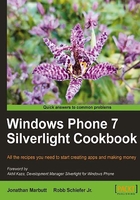
Conventions
In this book, you will find a number of styles of text that distinguish between different kinds of information. Here are some examples of these styles, and an explanation of their meaning.
Code words in text are shown as follows: "After finding the control in the assets window, drag-and-drop them onto your control.Blend."
A block of code is set as follows:
<VisualTransition GeneratedDuration="0:0:1"> <VisualTransition.GeneratedEasingFunction> <ExponentialEase EasingMode="EaseInOut"/> </VisualTransition.GeneratedEasingFunction> </VisualTransition>
When we wish to draw your attention to a particular part of a code block, the relevant lines or items are set in bold:
<Storyboard>
<DoubleAnimation Duration="0" To="26" Storyboard.TargetProperty="(FrameworkElement.Height)" Storyboard.TargetName="textBlock" d:IsOptimized="True"/>
</Storyboard>
New terms and important words are shown in bold. Words that you see on the screen, in menus or dialog boxes for example, appear in the text like this: "We need to create a new Windows Phone Application after clicking New Project in Visual Studio".
Note
Warnings or important notes appear in a box like this.
Tip
Tips and tricks appear like this.